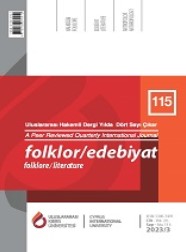Yokluğun Yüceltilmesi ve Kendiliğin Nesneleşmesi Üzerine Bir Tartışma: “Adem Kasidesi”
A Discussion on the Glorification of Absence and the Objectification of the Self: “Adem Kasidesi”
Author(s): Birsel SağıroğluSubject(s): French Literature, Existentialism, Psychology of Self, Theory of Literature
Published by: Uluslararası Kıbrıs Üniversitesi
Keywords: “Adem Kasidesi” absence; alienation; being for oneself; Jean Paul Sartre;
Summary/Abstract: In this study, I tried to analyze the subject of poetry’s relationship with “absence” through Jean Paul Sartre’s (1905-80) work titled Being and Nothingness. I utilized the concept analysis method to uncover the idea of nothingness in the “Adem Kasidesi” using Sartre’s concepts of “alienation, “being-in-itself,” “being-for-itself,” and “being-for-others.” Absence appears in the poetry in two different ways, resulting from the weakening of the subject’s bond with external reality. This study asserts that absence appears in poetry as “glorification” rather than “objectification of the self.” The latter means the disengagement of the subject from the social sphere. However, the subject does not entirely disconnect from external reality in the poetry but ignores the public sphere and threatens it with absence. Absence is exalted and disturbs the existence. The subject in the poetry is alien to the external world. It constructs a new “self,” albeit fragmented. The subject in the poetry positions itself, with a concept outside of the established consciousness, therefore, as nothingness. Consequently, the subject initiates alienation. According to Sartre, the Ego (being-for-itself) defines the cultural subject that is outside the primordial and natural being (being-in-itself). Alienation results from one’s recognition and rejection of the cultural subject. The subject of poetry becomes alienated initially as it exits the public sphere. Afterward, glorifying absence alienates external reality. Therefore, the presence-absence relationship does not complement each other, as in common sense. Absence contributes to the re-subjectivation process as a glorifying value that determines presence. The subject’s lack-desire-completeness relationship is problematic, and in poetry, the subject seeks completeness with absence.
Journal: Folklor/Edebiyat
- Issue Year: 29/2023
- Issue No: 115
- Page Range: 833-848
- Page Count: 16
- Language: Turkish

